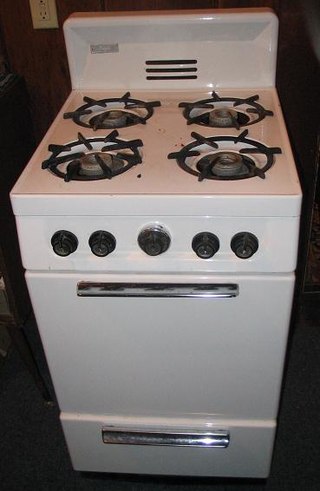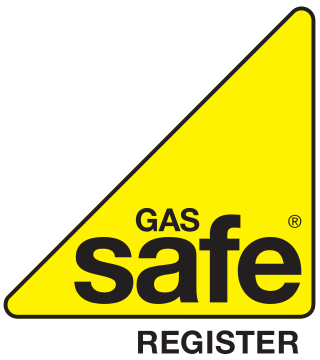Related Research Articles

Heating, ventilation, and air conditioning (HVAC) is the use of various technologies to control the temperature, humidity, and purity of the air in an enclosed space. Its goal is to provide thermal comfort and acceptable indoor air quality. HVAC system design is a subdiscipline of mechanical engineering, based on the principles of thermodynamics, fluid mechanics, and heat transfer. "Refrigeration" is sometimes added to the field's abbreviation as HVAC&R or HVACR, or "ventilation" is dropped, as in HACR.

The Health and Safety Executive (HSE) is a British public body responsible for the encouragement, regulation and enforcement of workplace health, safety and welfare. It has additionally adopted a research role into occupational risks in the United Kingdom. It is a non-departmental public body with its headquarters in Bootle, England. In Northern Ireland, these duties lie with the Health and Safety Executive for Northern Ireland. The HSE was created by the Health and Safety at Work etc. Act 1974, and has since absorbed earlier regulatory bodies such as the Factory Inspectorate and the Railway Inspectorate though the Railway Inspectorate was transferred to the Office of Rail and Road in April 2006. The HSE is sponsored by the Department for Work and Pensions. As part of its work, HSE investigates industrial accidents, small and large, including major incidents such as the explosion and fire at Buncefield in 2005. Though it formerly reported to the Health and Safety Commission, on 1 April 2008, the two bodies merged.

Professional diving is underwater diving where the divers are paid for their work. Occupational diving has a similar meaning and applications. The procedures are often regulated by legislation and codes of practice as it is an inherently hazardous occupation and the diver works as a member of a team. Due to the dangerous nature of some professional diving operations, specialized equipment such as an on-site hyperbaric chamber and diver-to-surface communication system is often required by law, and the mode of diving for some applications may be regulated.

A gas stove is a stove that is fuelled by flammable gas such as natural gas, propane, butane, liquefied petroleum gas or syngas. Before the advent of gas, cooking stoves relied on solid fuels, such as coal or wood. The first gas stoves were developed in the 1820s and a gas stove factory was established in England in 1836. This new cooking technology had the advantage of being easily adjustable and could be turned off when not in use. The gas stove, however, did not become a commercial success until the 1880s, by which time supplies of piped gas were available in cities and large towns in Britain. The stoves became widespread on the European Continent and in the United States in the early 20th century.

A carbon monoxide detector or CO detector is a device that detects the presence of the carbon monoxide (CO) gas to prevent carbon monoxide poisoning. In the late 1990s, Underwriters Laboratories changed the definition of a single station CO detector with a sound device to carbon monoxide (CO) alarm. This applies to all CO safety alarms that meet UL 2034 standard; however for passive indicators and system devices that meet UL 2075, UL refers to these as carbon monoxide detectors. Most CO detectors use a sensor with a defined, limited lifespan, and will not work indefinitely.

A flue is a duct, pipe, or opening in a chimney for conveying exhaust gases from a fireplace, furnace, water heater, boiler, or generator to the outdoors. Historically the term flue meant the chimney itself. In the United States, they are also known as vents for boilers and as breeching for water heaters and modern furnaces. They usually operate by buoyancy, also known as the stack effect, or the combustion products may be "induced" via a blower. As combustion products contain carbon monoxide and other dangerous compounds, proper "draft", and admission of replacement air is imperative. Building codes, and other standards, regulate their materials, design, and installation.

Building regulations in the United Kingdom are statutory instruments or statutory regulations that seek to ensure that the policies set out in the relevant legislation are carried out. Building regulations approval is required for most building work in the UK.
A landlord's gas safety certificate, also referred to as the landlord's gas safety record, is required by law to be held for all rental accommodation in the UK where there are gas appliances present. The requirement is enshrined in the Gas Safety Regulations 1998. The law requires all gas appliances in a rented property to be checked annually, with a gas safety record being completed and a copy provided to tenants. The definition of "rented" is broad, covering accommodation that is provided under a contractual arrangement for domestic staff as well as rented properties in general.

In electrical safety testing, portable appliance testing is a process by which electrical appliances are routinely checked for safety, commonly used in the United Kingdom, Ireland, New Zealand and Australia. In Australia and New Zealand it is commonly known as Test and Tag. The formal term for the process is In-service Inspection & Testing of Electrical Equipment.

The Gas Safety Regulations 1998 is a United Kingdom statutory instrument regulating various activities relating to the safety of installations and appliances using natural gas and liquefied petroleum gas (LPG).

The Chartered Institution of Building Services Engineers is an international professional engineering association based in London, England that represents building services engineers. It is a full member of the Construction Industry Council, and is consulted by government on matters relating to construction, engineering and sustainability. It is also licensed by the Engineering Council to assess candidates for inclusion on its Register of Professional Engineers.

The National Examination Board in Occupational Safety and Health is a UK-based examination board offering qualifications in health, safety, environment and wellbeing management.

A wood-burning stove is a heating or cooking appliance capable of burning wood fuel, often called solid fuel, and wood-derived biomass fuel, such as sawdust bricks. Generally the appliance consists of a solid metal closed firebox, often lined by fire brick, and one or more air controls. The first wood-burning stove was patented in Strasbourg in 1557. This was two centuries before the Industrial Revolution, so iron was still prohibitively expensive. The first wood-burning stoves were high-end consumer items and only gradually became used widely.

Gas Safe Register is the official gas registration body for the United Kingdom, Isle of Man and Guernsey, appointed by the relevant Health and Safety Authority for each area. By law all gas engineers must be on the Gas Safe Register.
NICEIC is one of several organisations which assesses the competence of businesses undertaking electrical work in the UK. NICEIC is one of several providers given Government approval to offer Competent Person Schemes in England and Wales to oversee electrical work within the scope of Part P of the Building Regulations.

The oil and gas industry plays a central role in the economy of the United Kingdom. Oil and gas account for more than three-quarters of the UK's total primary energy needs. Oil provides 97 per cent of the fuel for transport, and gas is a key fuel for heating and electricity generation. Transport, heating and electricity each account for about one-third of the UK's primary energy needs. Oil and gas are also major feedstocks for the petrochemicals industries producing pharmaceuticals, plastics, cosmetics and domestic appliances.

Kitchen ventilation is the branch of ventilation specialising in the treatment of air from kitchens. It addresses the problems of grease, smoke and odours not found in most other ventilation systems.

The All-Party Parliamentary Carbon Monoxide Group (APPCOG) is an official All-Party Parliamentary Group of the UK Parliament, co-chaired by Barry Sheerman MP and Baroness Finlay of Llandaff. The group exists to tackle carbon monoxide (CO) poisoning in the UK, improve government policy around CO safety, and raise public awareness of the threat posed by toxic CO gas.
A competent person is designated by a company to ensure that the company's health and safety responsibilities are being met. This may be a legal obligation required of the company, to ensure that the business understands, and can act on, the health and safety risks that might occur during their particular type of work.
A chimney liner is the most operational part of a fireplace despite its relatively simple design. A chimney liner safeguards the chimney structure. The liner accomplishes this as it has a protective barrier that shields the brick and mortar from harm. The liner requires low maintenance and has a long-life expectancy, and boosts energy efficiency as it is an excellent insulator.
References
- ↑ "Find or check a Gas Safe registered business - Find or check a Gas Safe registered engineer in your area who can fit, fix and service your gas appliances". Archived from the original on 2010-11-22.
- ↑ "What is Gas Safe Register?". Archived from the original on 2013-04-20. Retrieved 2021-12-04.
{{cite web}}: CS1 maint: bot: original URL status unknown (link) - ↑ "What is Gas Safe Register?". Archived from the original on 2013-04-20. Retrieved 2021-12-04.
{{cite web}}: CS1 maint: bot: original URL status unknown (link) - ↑ "Gas Safe Register". hse.gov.uk. Health and Safety Executive. Archived from the original on 26 January 2025. Retrieved 26 January 2025.
- ↑ Kingston, Peter (23 March 2004). "Flushing out the dodgy plumbers". The Guardian . Retrieved 26 January 2025.
- 1 2 3 "Review of Domestic Gas Safety Report for the Health and Safety Executive" (PDF). hse.gov.uk. Health and Safety Executive. 2006.
- ↑ Partridge, Chris (10 November 2004). "Safety warning to tenants". The Independent . Archived from the original on 26 January 2025. Retrieved 26 January 2025.
- ↑ Stranks, Jeremy (2005). Health and safety law. Harlow : Prentice Hall. pp. 206–207. ISBN 9780131976467.
- ↑ Wylie, Ian (27 January 1996). "Blowing a gasket with the gasman As private contractors move in, the risk from leaks grows". The Guardian .
- ↑ "BBC Inside Out - Carbon Monoxide poisoning". BBC . 2 February 2007. Archived from the original on 7 September 2019. Retrieved 30 January 2025.
- ↑ "Licensing and certification to increase skills provision and utilisation amongst low-carbon SMEs in the United Kingdom". OECD Green Growth Papers. 2013.